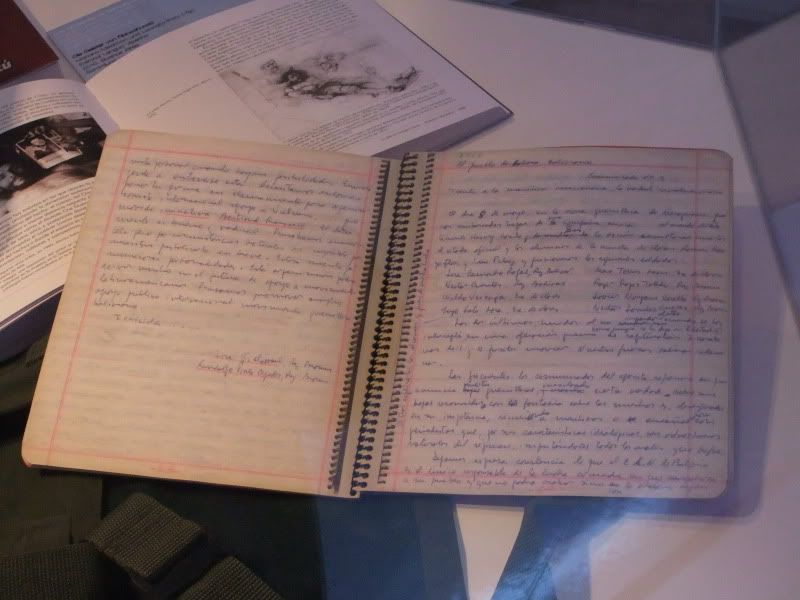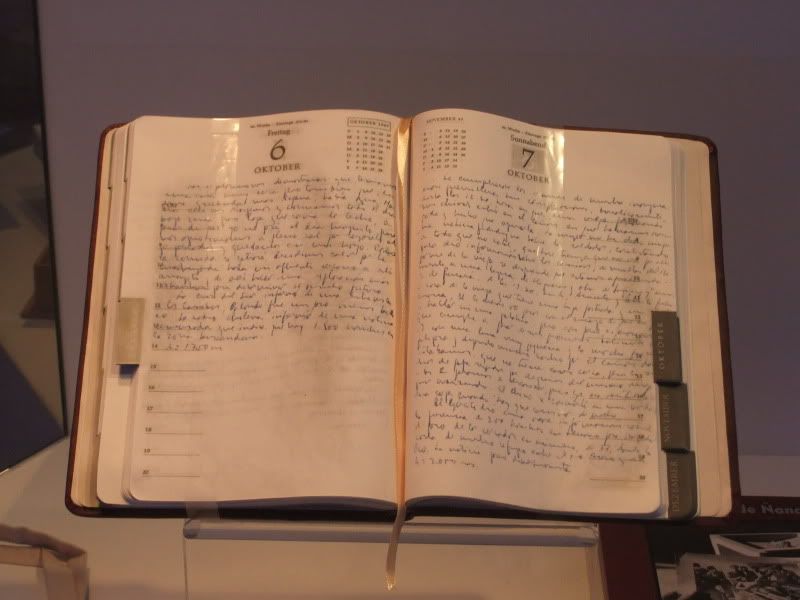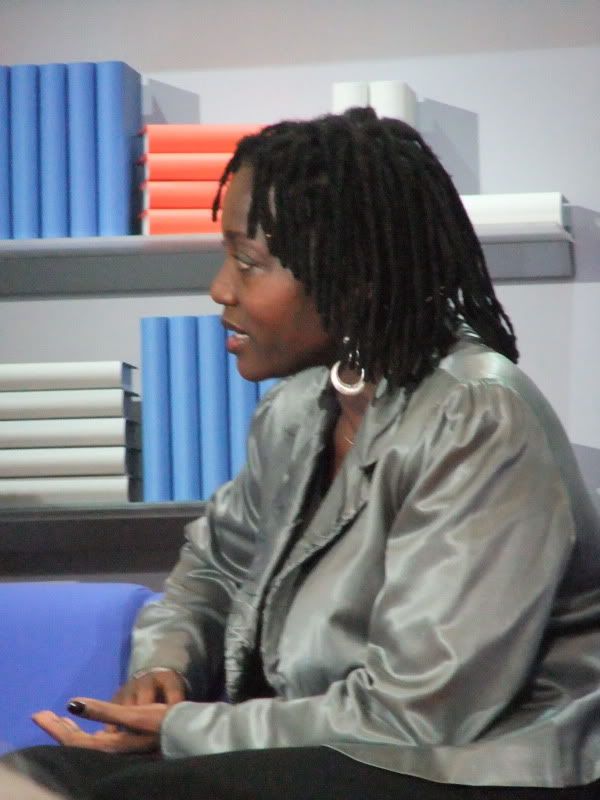Frankfurt Book Fair, Day Two and Three
First of all, some more photos from the Argentinian hall which wouldn't upload last time. The wall dedicated to the writers which were imprisoned, abducted and/or killed during the military dicatorship:

The trial of the generals:

Note books from young Che Guevara:


Thursday is traditionally the day all the bookstore interns visit, so it's nearly as crowded as the public weekend to come. I first hung out a bit with Eckhard Schmidt, who's the current head of the Karl-May-Verlag. For non Germans: Karl May = very popular late 19th century writer of what we'd call today pulp fiction, both Westerns and stories set in the Middle East. The publisher currently keeping his novels in print does publish other authors but only in as much as they relate to Karl May. Said publishing house is located in my hometown, Bamberg, which is one of the reasons why I know Mr. Schmidt. We talked about the fanfiction competition he's started (I'm in the jury, so

trobadora, if you participate, don't tell me), and how he had to convince the teachers of co-educated schools, i.e. most, that girls might enjoy reading K.M. and writing fanfic, too. "And the first story already arrived, and it's by a girl. I knew it!" reported Mr. Schmidt, beaming. I pondered on breaking the existence of slash to him, but then abstained; he's a nice guy, but I'm not sure that a "you know how you'd make your competition even more popular? Open it up for slash pairings!" would have flown. :) Incidentally, I asked him whether he licenced the recent "Winnetou among Werewolves" book that Piper published, and he said yes, he did, mostly because he wasn't sure whether if he'd forbidden the use they couldn't have done it anyway citing parody. I reassured him it was actually funny and written with affection, plus there aren't many German writers you could apply the "Pride and Prejudice and Zombies" formula to and hope to actually sell books. "Would you buy "Werther and the Vampires"? I asked. "You make an excellent point", he said. He also licenced a prequel written by Jörg Kastner about Hadschi Halef Omar, and as I got a copy I'll be able to read it.
Thursday was also the day Auma Obama, see last entry, was at the fair to promote her book; she was interviewed at a panel, and came across, as she does in what I've been able to read of the book, as an interesting and committed woman. The interviewer got the brother questions out of the way first, inevitably, and Auma O. pointed out that they don't make the difference in her language you usually do in German by adding "half-", i.e. "half brother, half sister" - because "how can a person be only half of something?" Her German, btw, is excellent, fluent and while still having a slight accent has no speech rhythm different from anyone born in Saarbrücken (where she first went to university). Later on the interviewer asked her why she picked German to learn at age 16 in Kenya, which must have been an unusual choice. (There were only four kids in the class willing to learn it.) "We read a Brecht play in English, and that got me interested", was the reply. (Der gute Mensch von Sezuan.) She then fell in love with the post war writers like Wolfgang Borchert, whose short stories and play featuring the immediate post war devastation, the hunger and the returning soldiers unable to reconnect with families she could identify with.
Wanting a scholarship to study in Germany and going there had a non-linguistic and literary reason as well, though: she said it was because at the time, she didn't think she could have the future she wanted as a woman in Kenya. She kept being told to serve the men of the family, not to argue back etc. Not because she wanted to turn her back on her culture (and she did eventually return), but because she did not want the traditional female life for herself. This lead to the interviewer asking how Auma balanced what to keep and what to reject of tradition and culture, and being told it was and is an ongoing work in progress. Auma said the women of the family, like her grandmother, were strong but in a backseat driving kind of way, they were great at diplomacy and letting a man thinking something was his idea when it was theirs, but that she, Auma, had never been able to do that, and still can't.
Working in various social programs both in Europe (Germany and England) and in Kenya (as a part of CARE), she finds it easier in Kenya, where the programs mostly deal with getting young people educated (not just in the scholary sense but also about how to prevent or deal with HIV, etc.). Speaking of education: one reason for writing the book, she said, and we got our Sarrazin allusion of the day, was that the next time people here in Germany go out on the street and see a black woman, they consider the possibility she could be as intelligent and culturally active as they are instead of automatically assume she's "not integrated". Audience applause.



Since this year's winner of the Nobel Prize for Literature was announced on Thursday, there was a somewhat embarassing kerfuffle gossiped about today, because Suhrkamp, the publishing house which publishes Mario Vargas Llosa in German, didn't have his books at their booth, so the current C.E.O., Ulla Berkewicz-Unseld, had to send someone to buy some paperbacks post haste so she could be photographed with them. (Today Suhrkamp evidently had hauled out their Vargas Llosas from the cellar.) Ulla B.-U. being the most unpopular widow ever to take over her husband's company in Frankfurt (not least because she decided to move the pusblishing house to Berlin last year), this attracted much Schadenfreude.
Meanwhile, I had another encounter of the "you mean there are girls/women who like Science Fiction?" type when chatting to German fantasy and horror novelist Marcus Heitz. We were mid-geeking out by comparing the DS9 episode Our Man Bashir to actual Bond films and praising the Babylon 5 storyarcs whe he suddenly stopped and said "This is the kind of discussion I usually have with guys. I didn't know there were women who liked" etc., you've heard it all before. Mind you, in a wide-eyed, puppy-eyed in fact and very pleased fashion, complete with "oh I wish there had been girls like that when I was in school!", so you couldn't be irritated because it was said in an endearing manner. I did point out it was a fangirl-centric campaign that got Star Trek its third season which was something of a hint a few decades ago that women/girls like Sci Fi, and shared reminiscences of the Highlander convention in Ashford a decade ago where there were 90% women between 40 and 50 and the rest mostly husbands, not fanboys.
Today offered the third variation of "women!like!science fiction!", though in a different manner, when I hung out with Perry Rhodan publisher Klaus Frick. (Perry Rhodan for non-Germans: longest running German sci fi series, has been published weekly since the 60s.) He's an immensely likeable guy and very nice to chat to, and so I usually see him during the book fairs. Now he's been to various Fed Cons (Fed Con = largest German sci fi convention), where as he said the attendance was 50/50 when it came to the female/male ratio, so the existence of female sci fi fans per se was not news to him. However, he did assume yours truly as an intermittent reader of PR was the exception for this particular series, since when they do Perry Rhodan only conventions, the attendance is 70 % male, 30 % female, and those 30 include girlfriends and wives who aren't really fans themselves. "I really want to change that, but how?"
Again, I decided against revealing the existence of slash. "At the next convention, include a panel in Perry/Atlan versus Perry/Bostrich versus Perry/Bully" would just have been too much of an outing of the fannish community, methinks. Otoh, "more recurring female characters" is an old chestnut, especially since they do try in that regard, and there are in fact several.
On a somewhat more literary note, I listened to a reading from a collection titled "Jewish Gouchos". Which is actually decades old but was only recently translated and published in German. The editor, Liliane Feinstein, said that one reason why she chose it was because when she said she was from Argentinia, people always responded with "ah, lots of Nazis, right?" and when she then said "actually, there is also a large Jewish community in Argentina" they said "ah, because of the WWII refugees, right?". Whereupon she has to explain that Jews in Argentina predate Hitler quite a lot. The collection of stories about Jewish immigrants in Argentina was first published in 1906 by a writer who was originally Russian-Jewish, emigrated to Argentina, and wrote it in Spanish; it was such a hit that he was choosen to represent Argentininan writers as the then ensuing Leipzig book fair. However, there is a second revised edition from much later in his life, 1936, which reflects him going from seeing Argentina as a better Zion than Palestine could be, basically, to becoming a Zionist in the traditional sense. The stories read by the translator were a bit expressionistic in language - "a golden wave of wheat", that kind of imagery - vivid, and captivating.
John Lennon's 70th birthday being tomorrow (I have my own post ready, since I wrote it last weekend), there were a couple of Lennon or Beatles related new books around. One short new German biography by Thomas Göthel - "J.L.: Musikgenie und Nowhere Man" - managed to avoid all the usual trapfalls; no "one true genius" rubbish, neither sanctification nor bashing a la Albert Goldman, in fact, nobody gets bashed at all. This was helpful since earlier I had come across a collection of writings on the Beatles through the last 40 years, which while containing such gems as a Leonard Bernstein essay on them also contains an innane statement by Noel Gallagher in which musical ignorance and complete lack of historical knowledge combine: "It's all due to Lennon; without him, Paul McCartney would have had the Beatles sing Yesterday until 1970." Am I glad I never bought a single Oasis cd, was my kneejerk reaction. (Assuming that Gallagher wasn't quite so stupid as to take How do you sleep? literally with its "the only thing you ever done was Yesterday" line, and that he was merely repeating the "Paul wrote the soft ballads, John the rock and experimental stuff" cliché, one is still tempted to him with a cd containing all the Paul-written rock songs from I saw her standing there to Helter Skelter he just declared out existence, as well as the McCartney initialized, dominated and virtually co-produced Sgt. Pepper's Lonely Heart's Club Band album, aka the most experimental one they did. Hell, add all the albums from Pepper onwards as well, since none of them would have been released if Paul hadn't assumed the unpopular taskmaster role and dragged the band into the studio time and again. Lastly, Gallagher, as a musician you should at least know the Beatles actually don't sing Yesterday at all. The only Beatle you hear on it is Paul - and his guitar -; the other musicians involved were a string quartet, which is why the Beatles never released the song as a single but basically hid it on the Help album.)
Also helping with the Noel-Gallagher-is-annoying feeling: Don McCullin published all the photos from the Mad Day Out session in 1968, which makes for an odd but vivid little book. McCullin had just returned from covering the Vietnam War when he was hired by the Beatles, mid-recording The White Album, to do a shooting since they needed some new photos originally meant to go with the album. You can google some of the results which are online, just enter "McCullin" and "Mad Day Out" and "Beatles"; see and be amazed at the horror of late 60s fashion (Paul in a pink suit comes particularly to mind). However, the book contains a lot of photos I hadn't seen before, going from the goofy (clowning at the piano with a fake parrot) to the "what drug were you on anyway that day?" ones (John and Paul stripping at the docks), and including one that turned incredibly macabre in 1980 since it's John posing as a corpse and the others grouped around him. This isn't the first time they posed like this (there is a Hamburg era photo like that out there, only with Paul as the dead body); it's the kind of thing you do when you're still in your 20s and think you'll live forever...
Two more days to go; tomorrow it's time to empathize with sardines and hide out in hall 8, where the English language books are...
This entry was originally posted at http://selenak.dreamwidth.org/615154.html. Comment there or here, as you wish.